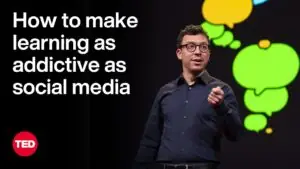Learning a new language is a rewarding and enriching experience, but it can also be challenging. With the right approach and strategies, however, you can significantly speed up the language learning process. In this article, we’ll explore some effective techniques for learning a new language fast, with a focus on immersion, vocabulary learning, studying with movies, comprehensible input, and real-life practice.

✅ AI Essay Writer ✅ AI Detector ✅ Plagchecker ✅ Paraphraser
✅ Summarizer ✅ Citation Generator

1. Set language-learning goals
Setting specific, measurable, and achievable goals is crucial for staying motivated and making progress in your language learning journey. Break down your language learning goals into short-term objectives, such as mastering a certain number of vocabulary words per week or being able to have a basic conversation within a month. Regularly review your progress and adjust your goals as needed to maintain motivation and focus on your desired fluency level.
2. Embrace immersion
Language immersion is one of the most effective ways to learn a new language quickly. By surrounding yourself with the language in various forms, such as listening to music, watching movies, reading books, or even participating in foreign language immersion programs, you can accelerate your language learning and improve your fluency. The more you expose yourself to the language, the faster you will develop listening, speaking, reading, and writing skills.
3. Learn the “right” words
Focus on learning the most commonly used words and phrases in your target language to maximize your communication abilities. Prioritize vocabulary learning by creating flashcards or using apps that help you memorize and practice essential words and phrases. By concentrating on the most useful vocabulary, you can quickly build a solid foundation for more advanced language learning.
4. Study with movies
Watching movies in your target language can be a fun and effective way to improve your listening and comprehension skills. Choose movies that interest you, and use subtitles in your native language or the target language to help you follow along. As you become more comfortable, try watching without subtitles to challenge yourself and further develop your listening abilities.
5. Utilize comprehensible input
Comprehensible input refers to language exposure that is slightly above your current level but still understandable. Engaging with comprehensible input, such as reading texts or listening to podcasts, can help you acquire new vocabulary and grammar structures in context, making it easier to remember and use them in real-life situations.
6. Participate in language exchanges
Language exchanges are an excellent way to practice speaking and listening skills with native speakers or other learners. By engaging in conversations, you can gain valuable real-life practice, receive feedback, and improve your fluency. Many language exchange platforms are available online, allowing you to connect with people from around the world and practice your target language in a supportive and engaging environment.
7. Stay consistent and persistent
Consistency is key when it comes to learning a new language fast. Dedicate time each day to practicing your target language, and make it a priority in your daily routine. Be patient with yourself, and remember that language learning is a gradual process. With dedication, persistence, and the right strategies, you can achieve fluency in your desired language more quickly than you might expect.
8. Use language learning apps and websites
Technology has made learning a new language more accessible and enjoyable. There are numerous language learning apps and websites available that offer lessons, quizzes, and games to help you learn and practice. Some popular options include Duolingo, Memrise, and Babbel. These tools can be a great addition to your language learning routine, as they provide interactive and engaging ways to improve your skills.
9. Join language clubs or meetups
Another effective way to practice and learn a new language is by joining language clubs or meetups in your area. These gatherings provide an excellent opportunity for real-life practice, as you can converse with native speakers and fellow language learners. Additionally, these social events make language learning more enjoyable and help you build a network of like-minded people who can support and encourage you on your journey.
10. Break down complex grammar rules
Language learning can be daunting, especially when it comes to understanding complex grammar rules. To make it easier, break down these rules into smaller, more manageable pieces. Focus on one grammar rule at a time and practice using it in different contexts. As you become more comfortable with each rule, your confidence and proficiency in the new language will grow.
11. Focus on pronunciation and accent
Having a good grasp of pronunciation and accent is essential for clear communication in any language. Spend some time each day working on your pronunciation by listening to native speakers and repeating after them. You can use resources like podcasts, YouTube videos, or language learning apps with audio components to fine-tune your pronunciation skills. Remember, practice makes perfect, so don’t shy away from mimicking native speakers as closely as possible.
12. Keep a language learning journal
Maintaining a language learning journal can be an effective way to track your progress and stay motivated. Use the journal to document new vocabulary, grammar rules, or interesting phrases you come across during your study sessions. Reflect on your learning experiences, challenges, and achievements. This journal will not only help you monitor your growth but also serve as a valuable resource for future review and practice.
13. Experiment with different learning methods
Everyone has unique learning preferences and styles. To find the most effective language learning techniques for you, experiment with various methods, such as visual aids, audio resources, or hands-on activities. For example, some people may prefer using flashcards to memorize vocabulary, while others might find it more helpful to associate words with images or actions. By trying out different approaches, you can discover what works best for you and tailor your language learning strategy accordingly.
14. Learn from your mistakes
It’s natural to make mistakes when learning a new language. Instead of getting discouraged, view them as opportunities for growth and learning. When you make a mistake, take the time to understand why it happened and how you can avoid it in the future. This process will help you develop a deeper understanding of the language and improve your skills more rapidly.
15. Celebrate small wins and milestones
Finally, remember to celebrate your achievements along the way, no matter how small they may seem. Recognizing your progress can help boost your motivation and keep you engaged in the language learning process. Set milestones for yourself, such as mastering a certain number of vocabulary words or holding a conversation for a specific length of time, and celebrate when you reach these goals. This positive reinforcement will encourage you to keep pushing forward on your language learning journey.
FAQ
What are the best ways to learn a new language quickly?
The best ways to learn a new language quickly include setting clear goals, creating a consistent study routine, immersing yourself in the language, focusing on vocabulary learning, engaging in real-life conversations, and using various learning resources like language apps, podcasts, movies, and books. Experiment with different learning methods to find the ones that work best for you.
How long does it take to learn a new language?
The time it takes to learn a new language varies depending on factors such as the learner’s dedication, learning methods, language complexity, and the similarity of the new language to the learner’s native language. According to the Foreign Service Institute (FSI), it can take between 24 and 88 weeks (600-2200 hours) of study to become proficient in a new language, depending on its difficulty level.
Can I learn a new language on my own, or do I need a tutor?
It is possible to learn a new language on your own using self-study methods and resources like books, apps, online courses, and multimedia content. However, having a tutor or participating in a language exchange can be beneficial for providing personalized guidance, feedback, and opportunities for real-life conversation practice. A combination of self-study and interaction with native speakers or tutors can lead to faster progress.
Are language learning apps effective?
Language learning apps can be an effective tool for learning a new language, especially when used in conjunction with other resources and methods. They offer a convenient and interactive way to practice vocabulary, grammar, and listening skills. However, apps should not be the sole method of learning, as they may not provide enough real-life conversational practice or immersion in the language.
How can I stay motivated when learning a new language?
Staying motivated when learning a new language involves setting clear, achievable goals, maintaining a consistent study routine, celebrating your progress, and finding engaging ways to practice the language. Connect with other language learners or native speakers, participate in language exchange programs, or join language learning communities to share your experiences and stay motivated. Additionally, focus on the reasons why you want to learn the language, such as career opportunities, travel, or personal growth.
Read more:
Mastering Language Learning with Preply and iTalki: Insider Tips and Strategies
Duolingo vs. Immersion: The Great Language Learning Debate
Why You Should Start Learning a Foreign Language
Follow us on Reddit for more insights and updates.





Comments (0)
Welcome to A*Help comments!
We’re all about debate and discussion at A*Help.
We value the diverse opinions of users, so you may find points of view that you don’t agree with. And that’s cool. However, there are certain things we’re not OK with: attempts to manipulate our data in any way, for example, or the posting of discriminative, offensive, hateful, or disparaging material.